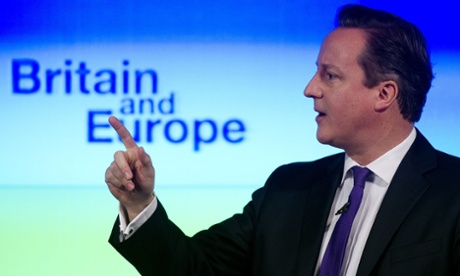From employment rights to environmental standards, many of the most cherished legal protections in British life could be rewritten at will by the government under sweeping new powers proposed by the “great repeal bill”.
David Davis, the minister in charge of shepherding this giant legislation through parliament, insists such authority will only be used to carry out whatever “technical changes” are deemed necessary to keep British law functioning as he negotiates the UK’s departure from the European Union.
But campaigners and lawyers from both sides of the political spectrum have sounded alarm bells about the precedent, practicalities and purpose of a bill described as “one of the largest legislative projects ever undertaken” by the House of Commons library.
The great misnomer
The first and perhaps most cosmetic concern is that the exercise has been deliberately misnamed. Though styled after the radical great reform bill of 1832, it could, as even supporters like Davis concede, just as easily have been called the “great continuity bill”, since it largely transposes existing EU law rather than aiming to introduce new rules.
“That doesn’t have the same appeal,” the Brexit secretary told MPs recently when asked if it would be more accurate to describe the legislation as the great conversion bill.
It would have played a more radical role in its original conception, since its first provision is to overturn the 1972 European Communities Act and therefore formally restore parliamentary sovereignty at the moment that Britain leaves the EU.
But since a high court challenge forced the the government to ask MPs to vote for Brexit when it invoked article 50, this symbolic parliamentary handover is arguably already under way.
Instead, no matter what you call it, the great repeal bill has become home to the plumbing rather than the poetry of the Brexit process: unpopular with remain supporters for obvious reasons, but also hardly the bonfire of regulations once imagined by leavers.
Henry VIII powers
The desire for continuity does not mean it is without controversy. More substantive worries are growing over the way government ministers plan to convert the European “acquis” into UK law.
With so much to get through in so little time, not everything can be covered in the initial bill, so the government proposes using statutory instruments to “create a power to correct the statute book where necessary, to rectify problems occurring as a consequence of leaving the EU”.
To make matters worse, it needs enough flexibility to “support a scenario where the UK left the EU without a deal in place”, suggesting a possible avalanche of last-minute changes if Brexit talks fall apart in the final hours before 30 March 2019.
Though Davis insists there is no intention to weaken rights or substantially change regulation along the way, critics have compared the powers to those assumed by Henry VIII in their ability to overturn primary legislation through the use of less accountable secondary legislation.
The Labour MP Clive Lewis has vowed to fight this “Henry VIII clause”, warning: “If we fail, and allow Theresa May to assume the powers of a renaissance monarch, our divisions will grow and our future will look bleak.”
The Green MP Caroline Lucas said: “Far from being ‘technical’, the great repeal bill is a huge attack on our democracy. The government wants unlimited power to amend law.”
Not radical enough?
It is not just politicians on the left who are uncomfortable about the wholesale rewriting of regulations.
Though most Tories support the aims of the bill, many are using its passage to underline their desire to eventually scrap many of the EU rules that it will transfer. For example, Iain Duncan Smith used an editorial in the Daily Telegraph this week to launch a campaign for a bonfire of EU regulations once the bill is out of the way, “to put Britain on a radically different course”.
No one is yet suggesting getting in the way, but if life gets trickier for the government, it may not be able to take the enthusiasm of its rightwingers for granted, and they could use the power to start their bonfire of regulations early.
For now, the white paper underlines that the case law of the European court of justice and text of EU treaties will continue to hold sway, and indeed precedence, over UK law.
“Above all, [the white paper] implicitly confirms that there can be no clean break from the EU,” said Ashurst competition lawyer Catherine Hammon. “It loudly celebrates taking back of control and reasserting British sovereignty, but there is a clear acceptance in the detail that in practice this is going to be a very gradual process, and there will be no immediate bonfire of EU derived-regulation.”
Davis says in the introduction to the white paper: “Taking back control does not require us to do everything overnight.”
Civil liberties
There are few clearer examples of this than the fact that some civil rights lawyers took comfort from a line in Davis’s statement where he pledged that: “The UK’s withdrawal from the EU will not change the UK’s participation in the European convention on human rights, and there are no plans to withdraw from the ECHR.”
Before the EU referendum, Theresa May, in her role as home secretary, repeatedly threatened to pull out of the convention and the European court of human rights in Strasbourg, and put it on hold only because of the complexity of Brexit negotiations. Other commentators suggested “no plans to withdraw” meant that ditching the convention would merely be postponed until the Conservatives launched their 2020 election manifesto.
Nonetheless, campaigners are calling for all of the EU’s charter of fundamental rights to be incorporated in UK law, a proposal that Davis rejected outright. Martha Spurrier, the director of Liberty, said: “This white paper has gaping holes where our rights should be. Where’s the guarantee to protect our EU rights so we don’t end up worse off than our neighbours across the Channel? Where’s the guarantee of proper democratic scrutiny?
“How can the government trumpet a ‘stronger, fairer Britain’ if its approach means we’ll end up with fewer rights than we have now? We urgently need an independent audit of the human rights protections the public stand to lose – and then a formal commitment that every one of them will be safeguarded.”
Devolution minimus
Davis also repeated May’s declaration on Tuesday that the administrations in Scotland, Wales and Northern Ireland would have “a significant increase in the decision-making powers” as a result of the restoration of authority from Brussels. This could be a boon to nationalist constituencies in Wales and Northern Ireland, which have been campaigning for more powers. However, critics say this could amount to little more than being given the power to enforce policies set in Westminster.
Plaid Cymru said it was concerned about the white paper stating explicitly that “EU responsibilities in the fully devolved fields – agriculture, environment and transport – will be taken by Westminster”. It branded the bill as the “biggest power grab” since the annexation of Wales in 1536.
“The people of Wales voted to leave the European Union and to take back control – they did not vote to allow unelected Whitehall Britocrats to grab power for themselves,” said the MP Jonathan Edwards. “Wales also voted to make our own parliament responsible for the governance of our country in multiple devolution referenda – transferring responsibilities away from the bloated Westminster system and closer to the people of Wales.”
Davis argues that it is vital for the integrity of the UK single market that economic rules do not become fragmented when they return from Brussels.
Legal minefield
Despite the scale of the bill’s ambition, the white paper is short, with just a page or so to deal with devolved powers alone. The government also does not intend to publish a draft bill, suggesting that much of the fine detail has yet to be worked out and that the white paper is only the “start of a conversation”.
The paper does, however, reveal the scale of the challenge, saying around 8,000 laws may need to be converted into domestic law. There are currently 12,000 EU regulations in force, with “7,900 statutory instruments in the UK which have implemented EU legislation”. In terms of acts of parliament, around 15% will have to be amended, with 186 of the 1,302 acts implemented between 1980 and 2009 incorporating some degree of EU influence.
Davis indicated earlier this month that two “substantive” white papers would follow on from Thursday’s, relating to finance and immigration, but many more are expected.
The lack of transparency and parliamentary oversight is causing growing legal concern that legislation may be passed in haste and regretted at leisure.
“Brexit is likely to cause the biggest legal train crash in modern history,” said Robert Bell, head of the EU and UK competition team at the international law firm Bryan Cave. “The consequences, together with the problems of legal interpretation and the uncertainties created, will be felt for generations. It is the modern equivalent of Henry VIII’s break with Rome, except many times more complex.”













